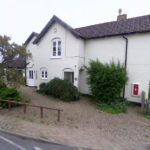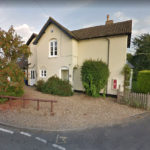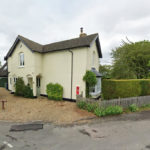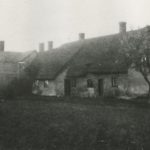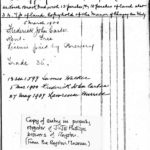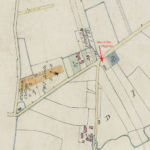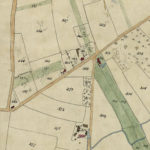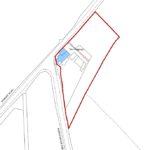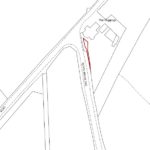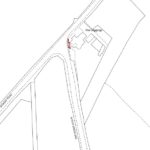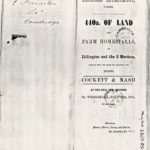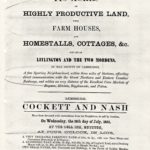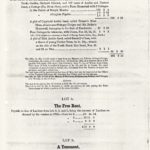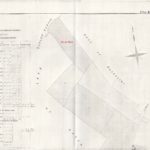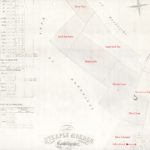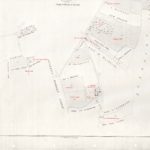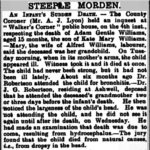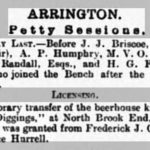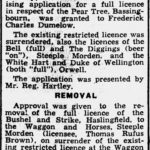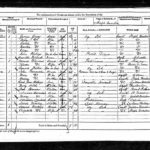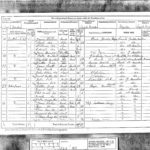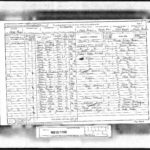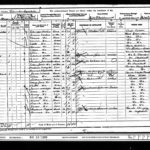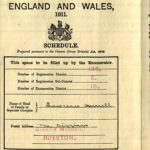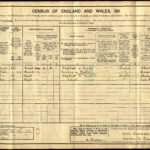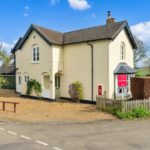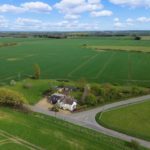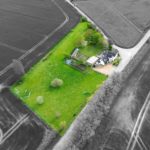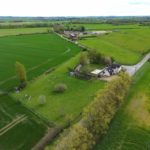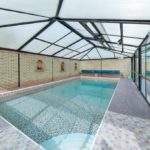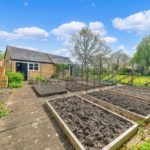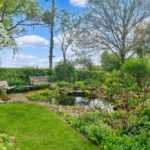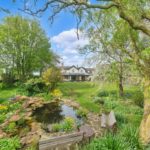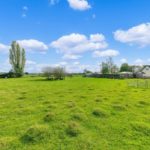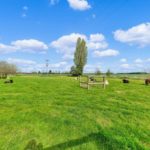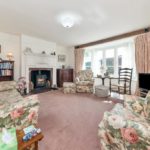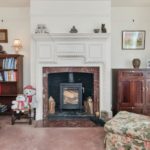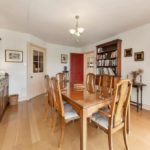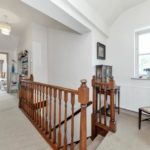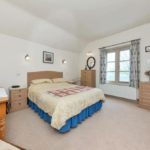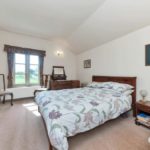The Diggings PH, North Brook End
Built as a beerhouse in the mid-1860s, this property is today a private house, generally known as The Diggings, North Brook End, although it may also be known as 2 Shingay Road or 2 Flecks Lane. Diggings is sometimes spelt Diggins. In a newspaper report in the Royston Crow 12 February 1897 of an inquest held on the death of an infant child the venue was described as Walker’s Corner public house, so-named after the licensee James Walker, who ran The Diggings from 1879 to 13 October 1897.
The Diggings was built to quench the thirsts of those extracting coprolites from the surrounding fields, which involved digging down at least 8 feet and often as much as 14 feet, in this area. Equipped only with spades and heavy wooden wheelbarrows this was not work for the faint hearted. It is believed that the excavations came very close to The Diggings, as one of the best veins of coprolites apparently ran under the adjoining cottages!
Despite suggestions elsewhere, there was no great building programme or creation of a settlement at North Brook End at this time. The Diggings is a prominent new building that can be attributed to the coprolite “gold-rush” and the only other is another beerhouse The Little Wonder built around the same time just down the road towards Steeple Morden village.
The site of The Diggings is shown below on the Enclosure Map 1807-1817 and Tithe Map 1839. The land was Copyhold of Shingay Manor and in this area of North Brook End there were a number of old enclosures, established prior to the Parliamentary Enclosure of the open fields, which in Steeple Morden began in 1807 and was completed in 1817. These old enclosures were in various ownerships and generally did not feature in the Enclosure Award, except that plot number 29 on the map was described as “old inclosure exchanged from Jesus College to Lucy Wescomb, freehold, part of Nutt Grove 0a 2r 0p. Adjoining on north east and south east remaining part of Nutt Grove, south east old inclosure of Lord Willoughby de Broke, south west ancient lane and north west Shingay Road”.
By marriage and descent, Lucy Wescomb had inherited land that had belonged to the Gatward family, which for many years had substantial land holdings at North Brook End and the family were also the long-term lessees of the Jesus College land there. She had been recorded as owner in the 1839 Tithe Apportionment and her tenant was Henry Theobalds. Her non-leasehold holdings at that time were:
| Plot No | Description | Use | Extent |
| 312 | Tithe Free Close [Tithe free] | Pasture | 1a 1r 31p |
| 313 | Tithe Free Close [Tithe free] | Pasture | 2a 1r 29p |
| 314 | Cottage and Garden [Tithe Free] | 0a 2r 16p | |
| 315 | Close [Tithable] | Arable | 0a 2r 7p |
On 18 July 1855 the Wescomb Estate, both freehold and leasehold, was sold and dispersed. The North Brook End Farm had been sublet by Wescomb to Abraham Pearmain, but the freehold land in North Brook End and the leasehold interest in the Jesus College Farm were acquired by Frederick James Hunt.
The Diggings was a purpose built public house and was erected for Philip & Arthur Hugh Meyer in the mid 1860s. They were brothers and came from a well-off farming family in Arrington. By 1861 Philip Meyer described himself as brewer and his brother as innkeeper and in 1871 both called themselves brewers. It is said they fell out with the Earl of Hardwicke, so when in 1874 they built a brand new brewery in Cambridge Road, Wimpole, it was on the Orwell side of the road and became known as the Orwell Brewery.
They purchased the land for The Diggings from Frederick James Hunt on 7 October 1863 and the beer house was built soon thereafter. The Meyers, are described in the conveyance of the land, as common brewers, which means they brewed for sale to others. This suggests that they had ambitions, from an early date, to grow their brewing business and were prepared to lay out capital to that end. Eventually having built their empire, which from 1892 included The Bell in Cheyney Street, the Meyers sold out to J & H Phillips of Royston Brewery on 1 December 1897 and in turn Phillips’ business was bought by J W Green of Luton in 1949, with Greens changing their name to Flowers Breweries in 1954.
Ownership of The Diggings remained with the two Meyer brothers personally and was not part of the Brewery business sold to Phillips on 1 December 1897, although Phillips leased the property to continue it as a beerhouse. After Arthur Meyer died in 1909, his executors, who were brother Philip and John Bonnett sold the property on 1 November 1910 to Capt J H J Phillips. It was common at the time, with family owned breweries, for their public houses to be owned by members of the family and leased to the brewery. The Phillips family at some point transferred all the family owned properties to the Company J & J E Phillips Ltd, which was formed in 1897.
The tenants or licensees of the public house, known to date are:
| Dates | Tenant or Licensee | Notes |
| 1871-1879 | Edward Williams | |
| 1879-13 Oct 1897 | James Walker | |
| 1897-5 March 1900 | Vacant ? | |
| 5 March 1900-27 May 1907 | Frederick John Carter | |
| 27 May 1907-1937 | Lawrence Hurrell | |
| 1937-1954 | Reginald Williams | |
| 1954-1956 | Norman Williams | |
| 1956 | Closed as a Public House |
A copy of Phillips Brewery’s property register is reproduced below.
Frederick Carter originated from Shepreth. His daughter Hannah had a daughter Hilda, who married Donald Williams, of the Williams family featured below.
Please visit this page for more about Lawrence Hurrell
Norman Williams was the son of Reginald. The Williams family were long established in Steeple Morden and adjoining parishes, since John Herbert Williams or was he Herbert John, from somewhere in Wales, married Mary Leete, who was of the family that aspired to the status of landed gentry in Guilden Morden. In consequence Mary and her husband acquired two properties in Steeple Morden, where they settled. The family duly grew in numbers.
Newton Hunt, who farmed North Brook End Farm, had his own idiosyncratic way of referring to his neighbours and Reginald Williams was Pigeon Williams and Norman Williams was Jolly Williams.
The Diggings remained a beerhouse up to the time it closed in 1957 and its Beer Licence was surrendered in March 1958. It became a private house. after J & J E Phillips, a subsidiary of Flowers Breweries Ltd, sold it on 11 January 1958 to Miss Isoline Blanche Sahler, a retired general shop keeper of Church Street, Litlington. More about Miss Sahler.
The conveyance contained this restrictive covenant:
“THE Purchaser hereby covenants with the Vendors for the benefit of each and all the licensed properties of the Vendors or of Flowers Breweries Limited of which the Vendors are a wholly owned subsidiary or of any other Company which is a wholly owned subsidiary of Flowers Breweries Limited situate in the Counties of Hertford, Cambridge and Essex respectively and in particular for the benefit of “Edward the Seventh” Public House and the “Chestnut Tree” Beerhouse situate at Guilden Morden in the County of Cambridge and so as to bind the property hereby conveyed the Purchaser hereby covenants with the Vendors that the Purchaser and the persons deriving title under her will not use or permit to be used the property hereby conveyed or any part thereof for the following purposes, namely (i) The manufacture sale or supply of beer wines spirits cider mineral waters or ice cream (ii) As a registered Club and (iii) As a petrol filling station or public garage”.
Isoline Sahler died 27 January 1963 and settlement of her estate, by way of Letters of Administration with Will attached, was handled by her nieces Veronica Margaret Blanche Carter and Isoline Joan Esperance Fortune, daughters of her sister Irene Sandison.
They sold The Diggings to a property development company Three Sevens Holdings Ltd for £1500. Three Sevens proposed to turn The Diggings into two flats, although it is not certain if that was fully accomplished. From 1964 to 1966 the property was let to Charlie and Pat Osborne and then to Julian and Olive Hallybone, who in early 1967 moved out to a flat at Morden House. Not long after in the same year Julian died of asthma and Olive became the first receptionist at the Doctors’ Surgery in Ashwell, when it was in the High Street and she lived in the flat above.
On 26 April 1967 Three Sevens sold the property for £3250 to George and Grace Fletcher, the parents of Liz Moynihan, wife of Dr Fergus Moynihan of Ashwell.
The Fletchers sold to Geoffrey and Meg Walker on 5 December 1979 for £50,005. On 10 December 1982 the Walkers agreed an exchange of land with Frederick Newton Hunt and Frederick James Hunt, whereby a plot surrounding The Diggings that included the site of the former cottages, a part of the old trackway and part of the field formerly owned by the Earl of Hardwicke were exchanged for a portion of Tithe Free Close acquired in 1863, when the Meyers bought the plot.
The Diggings was acquired by the present owners on 7 February 2025. The owners and occupiers as a private house can be summarised:
| Dates | Names | Notes |
| 1958-1963 | Isoline Blanche Sahler | From 11 Jan 1958 |
| 1963-1967 | Three Sevens Holdings Ltd | Owner |
| 1964-1967 | Charles W Osborne & Patricia A Osborne | Tenants |
| 1965-1967 | Julian G Halleybone & Olive P J Halleybone | Tenants |
| 1967-1979 | George Fletcher & Alethea Grace Fletcher | From 26 Apr 1967 |
| 1979-1987 | Geoffrey Walker & Meg Walker | From 5 Dec 1979 |
| 1987-2025 | Anthony Lawrence Coe & Anne Margaret Jenner | From 23 Jan 1987 |
| 2025-Today | Donald David Morley & Gemma Jane Morley | From 7 Feb 2025 |
The 1928 photograph below is one taken for the Cambridge Antiquarian Society and a contemporary print of this photograph was annotated “The Diggers Inn, Guilden Morden taken in bad light before a storm on 27 April 1928”
Click on any image below to view. Click again to enlarge. Drag to view entire image.
Photographs, Records & Maps Scroll down for more Photographs
Sale Particulars & Newspapers
Census
Photographs April 2024
Last Updated on September 13, 2025

